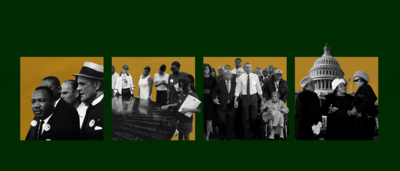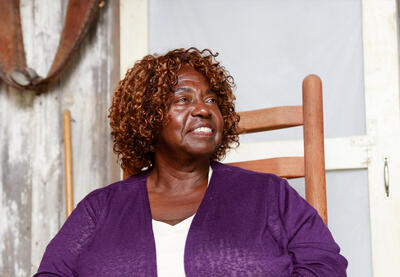Helen Sims, aka the Old Storyteller of Belzoni, Mississippi, teaches about the movement at the Rev. George Lee and Fannie Lou Hamer Civil Rights Museum. In this excerpt from her 2023 interview with Learning for Justice, Sims encourages accepting the torch that is being passed to us and embracing our roles in today’s justice movement.
Listening to the Older Folk Talk
When I was a little girl, [we] lived next door to what they call some civil rights activists. Now that’s when I first got exposed, being a child, not really knowing what was going on, but I heard them talking about how they was doing to folks, you know? How they didn’t want them to come in certain stores, they couldn’t go to certain restaurants … and how the Black folks had to go ’round to the back door.
So, they was talking about standing up and getting they rights to vote. That’s how I got exposed to the movement, sitting around, listening to the older folk talk about the struggle for civil rights and human rights and integrating the schools. … So, all those different things as a young child, I would hear them talk about, and I said, “That wasn’t right.” …
Talking About Movement History
The foundation of this museum was to preserve and promote the authenticity of American, African American and Mississippi history. We do that without compromise, but we do that in a manner that anybody listening – unless you want to be offended, you get offended. We ain’t going to apologize, but because we are sensitive to my nieces and nephews, and some of them is Indian, some of them is European, some of them is Mexican. So, when I go to the family reunion, I’ve got a loving family, and I love them and better not let nobody do nothing to them. I don’t care what they got in them ’cause that’s my family.
And from this front porch and these lips … I tell them, “It’s about the choices that you make and the steps that you take.”
To make a long story short, education – the truth about what happened, and who did it, not faulting nobody else for what somebody else has done, and to love everybody because the Bible and the good book says love them. …
You’ve got people in history from all sides. You’ve got people like Fannie Lou Hamer. … She looked at the condition of her people, and her heart went out, because to me, she was one of the greatest evangelists that God allowed to come in this world and take a breath – he used Fannie Lou Hamer to tell them, “I’m sick and tired of being sick and tired.”
She told them that it didn’t matter what color you were. If you was a human being in America and you had needs, Fannie Lou Hamer spoke up for you. If you came to her and you was a European, a white, Caucasian – whatever you want to call them – and you had a need, Fannie Lou Hamer went out of her way to make sure that she could help people, no matter what color they was.
Reverend George W. Lee was a minister of the gospel. He didn’t choose people because they was Black. He didn’t choose them because they were white. He didn’t reject them because they was either one or the other. But he loved all God’s people and wanted everybody to have a chance to have the power of the ballot to be able to choose who represents them. These are the kinds of things that we want our young people to remember. These people stood up.
The Torch Has Been Passed
In 1964 Freedom Summer, when they came from all over the world to Mississippi to speak up and stand up and even to educate people in the South, they did it because they cared about their fellow man. And the young people of today can keep that spirit alive. That torch been passed to them – it’s in their hands, and I say to the young people of today, “Follow in the footsteps of those ancestors that came before you – you can’t go wrong.”
And to the older people that may not understand what role they can play today, these young people that’s standing up for humanity do not need to stand alone, but they need our elders. … If they need buses, trains, whatever they need, you need to be the backbone of the foundation of the new generation and … the new frontier of the civil and human rights struggle for equal justice in America. That’s what you need to do.
Don’t let fear stop you from walking and standing on faith that hope lives in each of us, and we all still got a role to play. The struggle is still afoot. We are still fighting. The victory is not won yet, but we are gaining ground, and every victory that we gain, it seems like the enemy trying to take, but do not allow him to get away with it.
How do we do that? Our young people stand together all over the United States. You all begin an organization where each organization contacts another organization, where all of you come together as one unified group. And when you come together as a unified group, respect each other – because we need unity. We need to come together.
Reflection and Action
- Helen Sims shares local history stories about the Civil Rights Movement, especially the struggle for voting rights in Mississippi. Learn more about current voter suppression challenges with LFJ’s learning journey Understanding Voter Suppression in Today’s Election Process. Share and discuss with family, friends and others in your community the information about voter suppression.
- Helen Sims suggests starting an organization that helps connect different organizations who do similar work. This leverages the power of multiple organizations and harnesses strength in numbers. Got another idea? Use LFJ’s Action Planning Guide to map out a plan for your own grassroots action!
- Attend campaign rallies, town hall or local government meetings to ask questions and share your perspective. Alternatively, develop a series of testimonials about issues in your community as well as the experiences of young people. Using social media or in-person efforts, share these testimonials with officials and candidates who can help to effect change.
Interviews by Crystal Keels, Ph.D. (she/her), LFJ’s analyst for learning content, and Jacob Saylor (he/him), SPLC’s senior video producer.

Learning from the Civil Rights Movement
The Civil Rights Movement is a story of people who believed they could bring about change. The learning journeys and resources in this series can help us learn from our history and examine today’s justice issues to answer the questions: “How can I make a difference?” “How can we make a difference together?”
